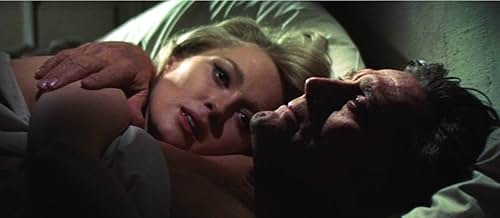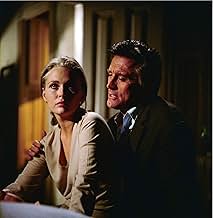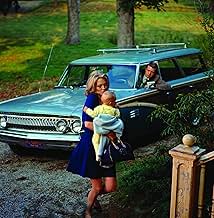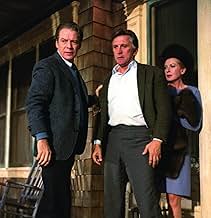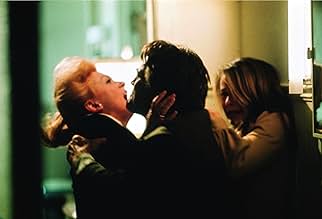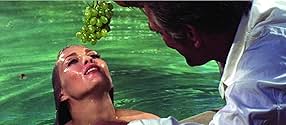VALUTAZIONE IMDb
6,3/10
3511
LA TUA VALUTAZIONE
Un pubblicitario tenta di ricostruire la sua vita in frantumi dopo aver subito un esaurimento nervoso.Un pubblicitario tenta di ricostruire la sua vita in frantumi dopo aver subito un esaurimento nervoso.Un pubblicitario tenta di ricostruire la sua vita in frantumi dopo aver subito un esaurimento nervoso.
- Premi
- 1 vittoria e 3 candidature totali
Carol Eve Rossen
- Gloria Anderson
- (as Carol Rossen)
E.J. André
- Uncle Joe
- (as E.J. Andre)
Donna Anderson
- Girl in Motel
- (non citato nei titoli originali)
Brian Andrews
- Child
- (non citato nei titoli originali)
Recensioni in evidenza
Some pretty big names, right at, near, or just past their peaks... kazan, douglas, dunaway, kerr, cronyn. Ed anderson is an ad man. (the irony of the "clean" cigarette campaign.) he has a midlife crisis. And of course, we flash back to what brought him to this point. Everyone wants to know what really caused it... the doctors, the therapists, coworkers, his wife. At the center of all this is gwen, the office "assistant", who doesn't have any clear duties. And now eddie wants to take care of his father, who has dementia. It's a psychological-thinker film. Izzokay. Moves pretty slowly. And gets pretty heavy. Lots of yelling. It's all well done, but i can understand why people thought it was such a downer. And so long. Keep an eye out for harold gould.. he was "miles" on golden girls. Written and directed by elia kazan. According to the trivia section, this kind of became his swan song.
Elia Kazan's 1969 midlife-crisis epic is an x-ray of American manhood gone cuckoo for Cocoa Puffs. Kirk Douglas, icon of tortured machismo, plays Eddie Anderson, son of a tyrannical Greek merchant (Richard Boone) turned Madison Avenue sell-out. He sleeps in childlike separate beds with his wife (Deborah Kerr), who looks and acts more like his mother. He's obsessed with the one woman (Faye Dunaway) who looks at his barbered, Lavoris'd self and sees the Man He Could've Been. The sixties satire of Organization Man is stock, the bombast beats thick and hard, and, as per usual, Kazan can't resist the Big Moments that are thoroughbred Hollywood hokum. But it's impossible to deny that this is as anguishedly personal as any of Kazan's movies--and the machete hacking through the brush that cleared the way for Cassavetes, Scorsese and Ferrara. With its mod, PETULIA-style sets, balletic editing and penchant for stylized tricks, it's also the most goofily cinematic of Kazan's pictures--a Sam Fuller whirligig turned into a slick, upscale thirty-second spot.
Not classic Kazan, for sure, but not a total failure either. Was lucky enough to see the film in Paris a few years ago on the big screen. Was struck by Kazan's attempt to break free from the well made play structure he'd so successfully mined in the past. The linear story, though, won out, making the film uneven and stylistically self conscience. But even so, what a marvelous failure. Kirk Douglas, in Kazan's opinion may not have filled Brando's shoes, but, my god, he tried. Dramatically speaking, the film is exploring a state of mind; the character played my Douglas remains, for the most part, in a very static position throughout. Douglas never allows the stain of self pity to disfigure his action. Sitting still, thinking, we see in Douglas a man pulsating with anger, remorse, and the need to act. It's a valiant and satisfying performance even though, like the film itself, we're more aware of what it's reaching for than what it actually holds. The performance, though, that really struck me as being brave and bold is the one given by Deborah Kerr. She's the wife, and she has a lengthy scene late in the film where she and Douglas stray into the intimate area of their married life. Sexually frank and mature, the scene alone is worth the entire film. These two characters discuss intimacy, and then act on it, in a way I've never seen in a film. Kerr was one of the most adventurous actresses of her day; a truly great talent. She gives Kazan the raw, unguarded kind of performance one usually associates with Liv Ullman in her Bergman films.
Just resaw this movie after 36 years. All I could remember from the first time I saw this film at age 11 was the car crash. Anyhow, outstanding acting by all involved. However, the movie is stolen by the powerful and emotional performance of Faye Dunaway. Miss Dunaway is stunning, both physically and emotionally. She grits her teeth and gives one of her most intense and raw performances. The film however, has a sad and depressing flip to it; the American Dream turned into a nightmare. Made in the last 1960s, to most young viewers this Elia Kazan masterpiece probably seems a weird and strange ride. However, for children of the 60s, this movie captures the "Nature of the Beast" which was 1969.
The Arrangement is outstanding.
The Arrangement is outstanding.
Old-fashioned melodrama longing to be flashy and modern. Director Elia Kazan, adapting his own bestseller, has assembled a terrific cast in story of a 44-year-old married advertising executive with a mistress who attempts suicide. Cold and detached, the film wants us to sympathize with a lot of people we might normally recoil from: the rich and privileged who live in a well-heeled vacuum. As Kirk Douglas' other woman, Faye Dunaway, who was featured in a slew of pictures from 1967-1969, was perilously at risk of being overexposed. She's gorgeously coiffed and manicured here, but her impassive face and personality don't involve the audience--and all of Douglas' striding up and down over her seems like a wasting disease. Kazan wants us to see the unsavory nature of these people, the office sharks and their suffering wives at the mercy of their whims, but the bitter 'truth' behind his portrait is heightened--just as it was in pictures like "Peyton Place"--and after a while it all begins to seem like a rancid put-on. ** from ****
Lo sapevi?
- QuizCritics were overwhelmingly negative when the film came out, and it was the consensus that Elia Kazan should never have filmed his own best-selling novel, which was panned by most literary critics as trash when it was published in 1967. It was widely known that the lead role had been turned down by Marlon Brando, who had garnered three Academy Award nominations and was awarded one Oscar under Kazan's direction at the beginning of his film career and was the heart and soul of some of Kazan's best work as a movie director. By the late 1960s, after a string of flops, most critics felt Brando was through as a movie star and that he desperately needed Kazan to turn his career around, both as an artist and as a box-office star. When the film came out, Kirk Douglas' lead performance was roundly panned, and most critics felt that even Brando at his best couldn't save what was, in essence, a melodramatic potboiler. The failure of "The Arrangement" was the end of Kazan's own career as an A-list director.
- BlooperWhen Eddie's father eats the piece of white bread, the number of bites and placement of the bread on the tray or his belly changes between shots.
- Curiosità sui creditiExcept for the title, company logo and "A Film Written and Directed by Elia Kazan," all the remaining credits are at the end, which was still uncommon in those days.
- ConnessioniEdited into Un Américain nommé Kazan (2018)
I più visti
Accedi per valutare e creare un elenco di titoli salvati per ottenere consigli personalizzati
- How long is The Arrangement?Powered by Alexa
Dettagli
Botteghino
- Lordo in tutto il mondo
- 9536 USD
Contribuisci a questa pagina
Suggerisci una modifica o aggiungi i contenuti mancanti



